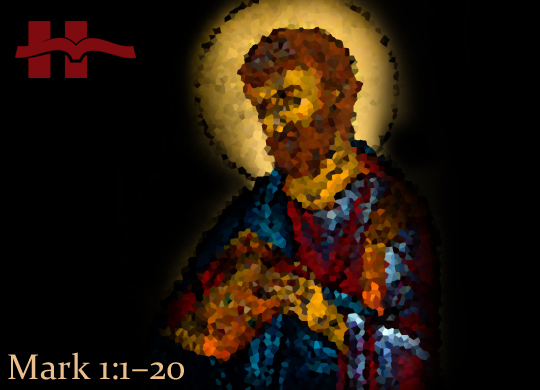Mark 1:1–20

The life-journey of discipleship, the beginning of the establishment of God’s kingdom, involves suffering.
And passing by the Sea of Galilee, He saw Simon and Andrew,
the brother of Simon, casting a net in the sea; for they were fishermen.
And He said to them, “Come after me, and I will make you become fishers of people.”
And immediately they left the nets and followed Him.
Mark 1:16–18
Quite an interesting beginning for a Gospel: Mark jumps right into the middle of it all—Jesus just appears on the scene, as if from nowhere. And Mark flashes some fighting words. His title for Jesus, “Son of God” (Mark 1:1), is quite a polemic term, alluding to Julius Caesar (the “divine”), and his son, Octavian (“son of the divine”). Moreover, “son of god” was often used of other Roman emperors, including Nero. And “gospel” was frequently associated with the birth, political ascent, and military successes of these rulers. So Mark is not only putting Jesus in the same category, but making him a rival to all other claimants to divine sonship. Here was Jesus, the One worth following, far greater than any of the Roman imperators.
And we are to follow him on “the way of the Lord” (1:3), on the journey of discipleship. “Get ready to follow,” Mark announces. The rest of his Gospel will proceed to explain how.
But there are some dark notes struck in this very first pericope of Mark’s good news. The ruggedness of John the Baptizer’s clothing and the sparseness of his diet (1:6), suggest an “other-worldliness.” This right after John is called to proclaim the good news (1:2–3): it’s all very ominous and foreboding.
Notice also what happens immediately after Jesus’ call (1:9–11): he is driven into a bleak wilderness to suffer the temptations of Satan—for 40 days! Ominous and foreboding, indeed!
That’s not all. John is said to be “given over/betrayed” (1:14)—he gets killed. The Greek word translated “given over/betrayed” is also often used of Jesus in this Gospel (3:19; 9:31; 10:33; etc.). He, too, gets killed.
Did you catch the patterning?
John is called by a divine voice, the Spirit, through the prophet Isaiah (1:2–3).
Jesus is called by a divine voice, the Father speaking from the heavens (1:11).
Disciples are called by a divine voice, the Son inviting the pair of brothers (1:16–20).
John is commissioned to preach repentance (1:2).
Jesus is commissioned and preaches repentance (1:14–15).
Disciples will preach repentance (3:14; 6:12).
The cost to John? Wilderness existence (1:3–4), and, finally, “given over/betrayed” (1:14)—killed by Herod.
The cost to Jesus? Wilderness ministry and temptation (1:9–13), and, finally, “given over/betrayed.”
The cost to the disciples?
It doesn’t take a rocket scientist, does it, to figure out what awaits the Christ-follower? In fact 13:9, 11, 12 have Jesus predicting that his followers, too, will be “given over/betrayed.”
Nope, this journey of discipleship is clearly not going to be an easy trip. Sacrifice and suffering are to be anticipated. This “Trip of Discipleship” demands much of the one following Jesus. It is clearly not a rosy picture of discipleship that is being painted, if what happened to John, and what will happen to Jesus, is any indication. Mark leaves readers hanging with a poignant question: “Will you follow, knowing what might happen as a consequence?”












 Abe Kuruvilla is the Carl E. Bates Professor of Christian Preaching at The Southern Baptist Theological Seminary (Louisville, KY), and a dermatologist in private practice. His passion is to explore, explain, and exemplify preaching.
Abe Kuruvilla is the Carl E. Bates Professor of Christian Preaching at The Southern Baptist Theological Seminary (Louisville, KY), and a dermatologist in private practice. His passion is to explore, explain, and exemplify preaching.